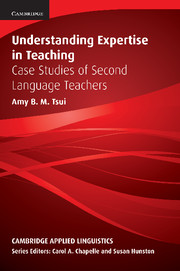Book contents
- Frontmatter
- Contents
- Series Editors' Preface
- Acknowledgments
- Chapter 1 Introduction
- Chapter 2 Conceptions of Expertise
- Chapter 3 Characteristics of Expert and Novice Teachers
- Chapter 4 Teacher Knowledge
- Chapter 5 The Case Studies
- Chapter 6 The Professional Development of the ESL Teachers
- Chapter 7 Teacher Knowledge and Managing the Classroom for ESL Learning
- Chapter 8 Teacher Knowledge and the Enactment of the ESL Curriculum
- Chapter 9 Taking on the Challenge: Exploring Process Writing
- Chapter 10 Understanding Expertise in Teaching
- Appendix 1 Reader's Comment Form on First Draft for the Second Writing Task (Angel's First Draft)
- Appendix 2 Learner Training in Making Revisions
- References
- Index
Chapter 2 - Conceptions of Expertise
Published online by Cambridge University Press: 05 October 2012
- Frontmatter
- Contents
- Series Editors' Preface
- Acknowledgments
- Chapter 1 Introduction
- Chapter 2 Conceptions of Expertise
- Chapter 3 Characteristics of Expert and Novice Teachers
- Chapter 4 Teacher Knowledge
- Chapter 5 The Case Studies
- Chapter 6 The Professional Development of the ESL Teachers
- Chapter 7 Teacher Knowledge and Managing the Classroom for ESL Learning
- Chapter 8 Teacher Knowledge and the Enactment of the ESL Curriculum
- Chapter 9 Taking on the Challenge: Exploring Process Writing
- Chapter 10 Understanding Expertise in Teaching
- Appendix 1 Reader's Comment Form on First Draft for the Second Writing Task (Angel's First Draft)
- Appendix 2 Learner Training in Making Revisions
- References
- Index
Summary
The systematic study of expertise began with the work of deGroot (1965), who investigated the differences between chess masters and less competent chess players. He found, for example, that chess masters are able to recognize and reproduce chess patterns very quickly and accurately whereas less competent players cannot. At about the same time, research had already begun on getting computers to simulate practical human intelligence in problem solving. Note the work of Herbert Simon and Allen Newall, which used an information-processing approach in getting computers to simulate master chess players (see Newall, 1963; Newall, Shaw, and Simon, 1963). Subsequently, there were further studies not only on experts in chess playing (see, for example, Newell and Simon, 1972; Simon and Chase, 1973), but on experts in other fields such as medicine, law, radiology, and aeronautics (Dreyfus and Dreyfus, 1986; Chi et al., 1988), nursing (Benner, 1984; Benner, Tanner, and Chesla, 1996), and physics problem solving (see, for example, Chi, Feltovich, and Glaser, 1981). More recent studies of expertise have covered experts in skills like dance (Solso and Dallop, 1995), music appreciation and performance (Sloboda, 1991), professional acting (Noice and Noice, 1997), and naturalistic decisionmaking of experts in a wide range of areas from nuclear power plant emergencies to the military (see, for example, the volume of collected papers in Zsambok and Klein, 1997). Some of these studies adopted an information processing approach, but some adopted fundamentally different approaches that are philosophical and phenomenological in orientation.
Information
- Type
- Chapter
- Information
- Understanding Expertise in TeachingCase Studies of Second Language Teachers, pp. 9 - 21Publisher: Cambridge University PressPrint publication year: 2003
